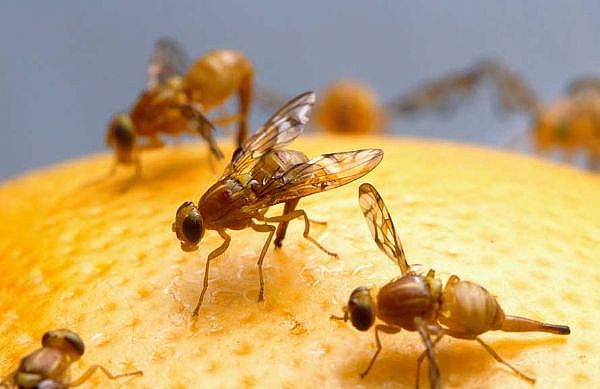Scientists have discovered that male fruit flies that have been rejected by females drink significantly more alcohol than those that have mated freely.
Published in Science, the study suggests that alcohol stimulates the flies’ brains as a “reward” in a similar way to sexual conquest.
The work points to a brain chemical called neuropeptide F, which seems to be regulated by the flies’ behavior.
Human brains have a similar chemical, which may react in a similar way.
The connection between alcohol and this chemical, which in humans is known as neuropeptide Y, has already been noted in studies involving hard-drinking mice.
The new work explores the link between such reward-seeking and the study of social interactions, said the lead author of the report Galit Shohat-Ophir, now of the Howard Hughes Medical Institute in Virginia, US.
“It is thought that reward systems evolved to reinforce behaviors that are important for the survival of both individuals and species, like food consumption and mating,” said Dr. Galit Shohat-Ophir.
“Drugs of abuse kind of hijack the same neural pathways used by natural rewards, so we wanted to use alcohol – which is an extreme example of a compound that can affect the reward system – to get into the mechanism of what makes social interaction rewarding for animals.”
Working in the laboratory of Ulrike Heberlein at the University of California, San Francisco, Dr. Galit Shohat-Ophir and colleagues subjected a number of flies to a wide variety of fates.
In one set of experiments, male flies were put in a box with five virgin females, which were receptive to the males’ advances. In another, males were locked up with females that had already mated and which thus roundly rejected the males’ attempts at sex.
Offered either their normal food slurry or a version charged with 15% alcohol, the mated males avoided the alcohol, whereas the sexually deprived males went on a comparative bender.
The team then went on a hunt for a chemical that could tie the two parts of this story together, hitting on neuropeptide F (NPF).

Scientists found that the heavy-drinking rejected males had a lowered level of the chemical, and sated, mated males had an elevated level.
“What we think is that these NPF levels are some kind of <<molecular signature>> to the experience,” Dr. Galit Shohat-Ophir explained.
To show that the NPF is actually responsible for the change rather than just associated with it, the researchers actively manipulated just how much NPF was in the flies’ brains.
Those with depressed levels acted like the rejected males, and those with elevated levels behaved like the mated males.
“What this leads us to think is that the fly brain – and presumably also other animals’ and human brains – have some kind of a system to control their level of internal reward, that once the internal reward level is down-regulated it will be followed by behavior that will restore it back,” Dr. Galit Shohat-Ophir said.
It is tempting, given that humans share a similar brain chemical, to imagine that NPF drives human behavior as well.
However, in an accompanying article in Science, Troy Zars of the University of Missouri wrote that “anthropomorphizing the results from flies is difficult to suppress, but the relevance to human behavior is obviously not yet established”.
Nevertheless, he suggested, “links a rewarding social interaction with a lasting change in behavior”.
“Identifying the NPF system as critical in this linkage offers exciting prospects for determining the molecular and genetic mechanisms of reward and could potentially influence our understanding of the mechanisms of drugs of abuse.”
